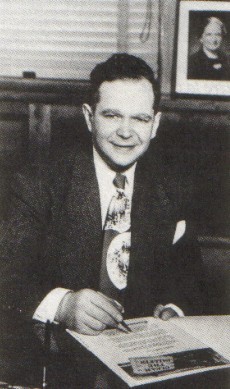Related Research Articles

The National Film Board of Canada is Canada's public film and digital media producer and distributor. An agency of the Government of Canada, the NFB produces and distributes documentary films, animation, web documentaries, and alternative dramas. In total, the NFB has produced over 13,000 productions since its inception, which have won over 5,000 awards. The NFB reports to the Parliament of Canada through the Minister of Canadian Heritage. It has bilingual production programs and branches in English and French, including multicultural-related documentaries.

Sydney Cecil Newman was a Canadian film and television producer, who played a pioneering role in British television drama from the late 1950s to the late 1960s. After his return to Canada in 1970, Newman was appointed Acting Director of the Broadcast Programs Branch for the Canadian Radio and Television Commission (CRTC) and then head of the National Film Board of Canada (NFB). He also occupied senior positions at the Canadian Film Development Corporation and Canadian Broadcasting Corporation, and acted as an advisor to the Secretary of State.

Michael Gwynne Dyer is a British-Canadian military historian, author, professor, journalist, broadcaster, and retired naval officer. Dyer rose to prominence in the 1980s with the release of his television series War in 1983 and the publication of an accompanying book in 1985. Since the 1960s he has lived in London, England, where he works as a syndicated columnist. Dyer is a noted expert in Middle Eastern affairs, having completed his graduate work in this area and written several books on the subject. More recently he has focused on climate change and its geopolitical consequences.

Alanis Obomsawin, is an Abenaki American-Canadian filmmaker, singer, artist, and activist primarily known for her documentary films. Born in New Hampshire, United States and raised primarily in Quebec, Canada, she has written and directed many National Film Board of Canada documentaries on First Nations issues. Obomsawin is a member of Film Fatales independent women filmmakers.
Robin Spry was a Canadian film director, producer and writer. He was perhaps best known for his documentary films Action: The October Crisis of 1970 and Reaction: A Portrait of a Society in Crisis about Quebec's October Crisis. His 1970 film Prologue won the BAFTA Award for Best Documentary.

Frank Radford "Budge" Crawley, was a Canadian film producer, cinematographer and director. Along with his wife Judith Crawley, he co-founded the production company Crawley Films in 1939.
Donald Code Brittain, was a film director and producer with the National Film Board of Canada.

Steinberg's was a large family-owned Canadian grocery store chain that mainly operated in the province of Quebec and later Ontario. In addition to its flagship supermarket chain, the company operated several subsidiaries across the country. The company went bankrupt in 1992, three years after being sold to private interests, after 75 years in business.

Samuel Steinberg, was a Hungarian-born Canadian businessman, investor and philanthropist. He was an immigrant to Canada who transformed the grocery store founded by his mother, Steinberg's Supermarket, into one of the largest chains in the Province of Quebec. By the time of his death in 1978, Steinberg's was the largest supermarket chain in Quebec.
Don Owen was a Canadian film director, writer and producer who spent most of his career with the National Film Board of Canada (NFB). His films Nobody Waved Good-bye and The Ernie Game are regarded as two of the most significant English Canadian films of the 1960s.

The Valour and the Horror is a Canadian television documentary miniseries, which aired on CBC Television in 1992. The series investigated three significant Canadian battles from the Second World War and was a co-production between the CBC, the National Film Board of Canada (NFB) and Galafilm Inc. The films were also broadcast by Radio-Canada, the French network of the CBC. The series was written by Brian McKenna, an award-winning journalist and founding producer of The Fifth Estate and his brother, Terence McKenna, and was directed by Brian McKenna.
The Champions is a three-part Canadian documentary mini-series on lives of Canadian political titans and adversaries Pierre Elliott Trudeau and René Lévesque.
Canada Vignettes are a series of short films by the National Film Board of Canada (NFB), some of which aired on CBC Television and other Canadian broadcasters as interstitial programs. The vignettes became popular because of their cultural depiction of Canada, and because they represented its changing state, such as the vignette Faces which was made to represent the increasing cultural and ethnic diversity of Canada. The Log Driver's Waltz directed by John Weldon set to the recording of the song by Kate & Anna McGarrigle with, and as part of, The Mountain City Four is one of the most-requested items contained in the collection by the National Film Board of Canada. A similar series was later produced in the 1990s, however the name was changed to Heritage Minutes.
Pacificanada is a National Film Board of Canada (NFB) Canadian documentary television miniseries about British Columbia which aired on CBC Television in 1975.
Terence Macartney-Filgate was a British-Canadian film director who directed, wrote, produced or shot more than 100 films in a career spanning more than 50 years.

Birth of a Giant is a 29-minute 1957 Canadian documentary film, directed by Hugh O'Connor and produced by the National Film Board of Canada (NFB) for the Canadian Broadcasting Corporation (CBC) television series, Perspective.

Neptune Mission is a 1958 30-minute Canadian short documentary film produced by the National Film Board of Canada (NFB) for the Canadian Broadcasting Corporation (CBC) television series, Perspective. The film documents the submarine-hunting mission of the RCAF Neptune aircraft on Canada's Atlantic coastline during the Cold War. Neptune Mission is produced by David Bairstow, and directed by Walford Hewitson.

Industrial Canada is a 1958 18-minute Canadian short National Film Board of Canada (NFB) documentary film produced, directed and edited by Guy L. Coté for the Canadian Broadcasting Corporation (CBC) television series, as part of the postwar Canada Carries On series. Industrial Canada documents the industrial development of Canada during the mid-1950s. The film's French version title is Le Canada industriel.

The Voice of Action is a 16-minute 1942 Canadian documentary film, directed by James Beveridge and produced by Raymond Spottiswoode. The short film was made by the National Film Board of Canada (NFB) as part of the wartime Canada Carries On series. The Voice of Action describes the importance of the Canadian Broadcasting Corporation (CBC) in the Second World War. The French version title of The Voice of Action is Dynamisme des ondes.
Arthur Henry Percival Hammond was a Canadian documentary filmmaker, associated with the National Film Board of Canada. He was most noted as codirector with Donald Brittain and John Spotton of Never a Backward Step, which won the Canadian Film Award for Best Feature Length Documentary at the 20th Canadian Film Awards in 1968, and for his 1968 film This Land, for which he was a Canadian Film Award nominee for Best Director at the 21st Canadian Film Awards in 1969.
References
- ↑ Betty Lee, "Steinberg's supermarkets the star of NFB's 6-part study". The Globe and Mail , 21 January 1974.
- ↑ Corcelli, John (August 2005). "Corporation". Canadian Communications Foundation. Retrieved 7 May 2010.